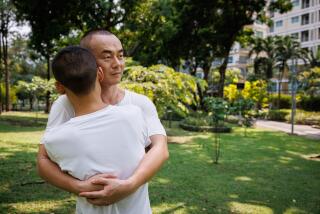Vietnamese Refugees Exchange Life in Hong Kong Camps for Marriage : Expatriates: Women denied asylum agree to wed men they barely know to avoid repatriation.
- Share via
HONG KONG — After six years locked in refugee camps, 26-year-old Dang Minh Thuy finally got a shot at freedom--by marrying a Hong Kong man she barely knew.
Fellow inmates came up with a wedding gown, and suddenly she and two other Vietnamese brides-to-be were whisked out of their dreary detention camp to a nearby marriage registry.
The brief civil ceremony was witnessed by prison officers and a few relatives. Wedding pictures were taken, and then it was back to Whitehead Detention Center to wait six more months for final release.
Thuy’s marriage to construction worker Hung Hing-biu was a cold, matter-of-fact affair. The Hong Kong Chinese is 19 years older than his bride. She speaks little Cantonese, and he speaks no Vietnamese.
Vietnamese brides are mostly sought out by men whose marriage prospects are slim because they’re too old, too poor or too low on Hong Kong’s social scale. The marriages give the women a chance to avoid forced repatriation to Vietnam, although it is not quite their dream of getting to the West.
“If I had a choice, I wouldn’t want to stay in Hong Kong. But I had a friend help me marry a Hong Kong man. At least that way I could get out of the jail I was staying in,” Thuy said.
She admitted she doesn’t have any deep affection for her new husband.
For his part, Hung said: “The Vietnamese women don’t have high standards. They hardly have any demands. I’m just a regular working man. If their standards were too high, it wouldn’t suit me.”
For the three women who married that day, almost anything is better than the endless boredom and frequent violence of camp life.
About 20,000 Vietnamese are in detention in Hong Kong, left over from the waves of “boat people” who fled after U.S.-backed South Vietnam fell to Communist North Vietnam in 1975.
Hong Kong people want them out and off the taxpayers’ backs. The government says they are mostly job-seekers, not political refugees. Moreover, it is anxious to close the camps before China takes over Hong Kong on July 1, 1997.
But it seems quite liberal about letting refugees marry their way into Hong Kong. Matches are made by go-betweens, photographs are exchanged, and a suitor can then get permission to visit a refugee in the camp.
Invariably, it is Vietnamese women who marry Hong Kong men--more than 500 in the last two years, according to the Correctional Services Department.
Once married, the women can apply for citizenship, which takes three to seven years.
Like Thuy, Phung Thuy Lien, 22, is a refugee from Haiphong, where her father was a shoemaker and her mother worked in a flour mill.
In 1988, at age 14, she left Vietnam with five relatives, hoping to settle in the West. But her trip ended in a Hong Kong camp.
“Inside the camp, there was no freedom. The food was bad,” she said. After four years, she married a warder.
“As long as it is out of the camp, I don’t care where I end up,” she said.
She seems to have settled in, frequenting karaoke bars and discotheques and taking evening classes in Mandarin and computers.
Vu Thuy Huong, 22, is less fortunate. Separated from her Hong Kong husband, she works as a saleswoman in the morning and as a waitress at a restaurant in the evening.
Arriving in 1991 on a boat with 45 other people, she was in a camp for three years and lost hope of reaching the West. A friend in the camp then introduced her to a 36-year-old restaurant worker.
“At our first meeting inside the camp, he looked all right to me. At the end of that meeting, he asked me whether I liked him and wanted him as a husband,” Huong said.
A month later she filed a citizenship application, and after eight more months, moved in with her husband.
But he started seeing another woman in China, she said. She believes that “my husband grew tired of me because I cannot speak Cantonese well.”
Nevertheless, Huong is still in the naturalization process. She said her husband has promised to cooperate with the periodic paperwork needed to keep the application alive. The government says that even if a woman divorced, it wouldn’t necessarily hurt her application.
She says she has no regrets. “In Hong Kong, I can earn money if I work hard enough. In Vietnam, it is useless even if I work hard.”
More to Read
Sign up for Essential California
The most important California stories and recommendations in your inbox every morning.
You may occasionally receive promotional content from the Los Angeles Times.













